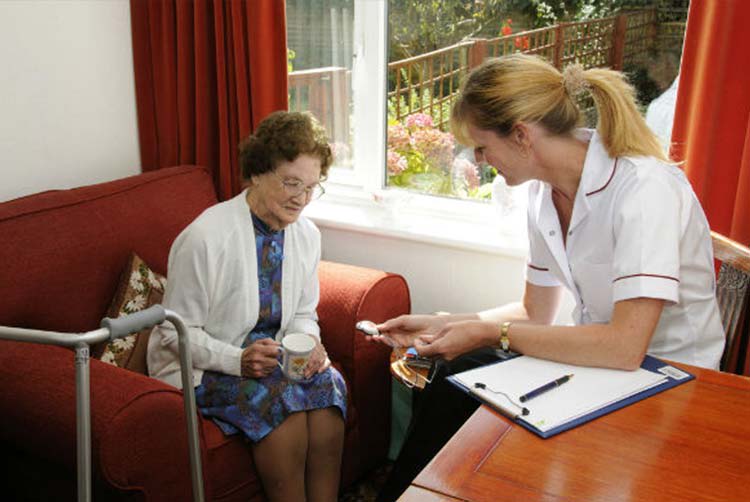Having access to emergency medical care is oftentimes a matter of life and death, and understanding your options is vital. Most importantly, it’s crucial to know the difference between at home and on-the-go monitoring systems.
Consumers who purchase medical alert systems, whether for at-home or on-the-go use, or both, will be connected to an emergency response center in the case they are injured or in some sort of danger. That being said, there are many options to choose from, including system functionality. To help you choose the best medical alert system for your specific needs, we'll help you answer two essential questions and provide our top 10 recommendations.
Home-Based vs. Mobile Devices: What are the differences?
When it comes to medical alert systems, there are a few options to choose from, including the choice between home medical alert systems and mobile alert systems. As explained above, both of the systems will alert the emergency response center to your emergency needs.
The only difference is that one is based within the home, and the other can be used from anywhere. Home alert systems are ideal for those limited to their homes, while mobile medical alert systems are great for more active users who can wear them while out running errands, hiking, or going about their daily lives.
Do I Need a Landline?
Traditional home medical alert systems typically require a receiver to be connected into a wall outlet and a landline phone jack, with some type of wearable pendant. Pressing the medical assistance device button will activate the call to the emergency response center, sending out a notification that you need help.
Mobile alert systems use a cellular network instead of a traditional landline, and can be used outside of the home. These mobile units can also be GPS-enabled, so that a person’s exact location can be detected in an emergency.
Now that you have a better understanding of the types of medical alert systems and their functional differences, how do you choose a medical alert system service? The final decision ultimately comes down to your personal needs - be it financial, functionality, or features.
To help make things easier, here’s a breakdown of the top medical alert providers for both at-home and on-the-go use.
Best Home Medical Alert Systems
1. Medical Guardian
- 2 months free
- Free shipping
- 30-day money-back guarantee
Medical Guardian boasts several features and systems to easily meet your emergency medical alert service needs. In addition to their traditional landline option, they also offer cellular line models, as well as those equipped with GPS tracking and fall detection.
2. ADT Health
- Free activation and next-day shipping
- 24/7 monitoring
- 6 monitoring centers
Another highly-scored company is ADT Health, which offers three models of medical alert systems, ranging from those with more limited capabilities and those requiring a landline to operate, to on-the-go systems with mobile connection, GPS, fall and household temperature monitoring.
3. Walabot
- Affordable monthly subscription
- 30-day money-back guarantee
- Install within minutes
Walabot’s home medical alert system is on the cutting edge of assistive technology. Using state of the art radio-frequency sensor technology, the console “learns” the dimensions of the room in order to automatically detect falls and irregularities in body movement. Affordable, easy to set up, and completely autonomous, Walabot’s offering is proving to be one of the best home alert systems for elderly users.
Best Mobile Medical Alert Systems
1. MobileHelp
- No long term contracts
- A+ BBB rating
- Save with annual plans
For those looking to cover two household residents and completely eliminate the need for a landline or cellular contract, then MobileHelp might be the best option in this scenario, as it scored well in many areas. This system also offers an optional medication reminder feature for an additional fee, to help remind you when to take your medications.
2. Medical Alert
- Monthly, annually, and semi-annually plans
- Free shipping
- Free 30-day trial
Medical Alert’s on-the-go devices were designed for seniors to feel independent no matter where they go or what activities they partake in. Lightweight, unobtrusive watches and pendants are equipped with fall detection and GPS technology that provide a large radius of protection and extra peace of mind.
3. LifeStation
- Protection plans offered
- Free shipping
- Free activation special
LifeStation’s mobile alert pendants have a 500-foot field range and ample technology for those who want to feel that their loved ones are in good hands. The mobile devices are lightweight, stylish, and equipped with GPS and fall detection capabilities to ensure that users are safeguarded in the event of a health emergency and that their families know they’re safe and sound even when they’re outside of the home.
A Home or Mobile Alert System: The Choice Is Yours
As you can see, there are many things to consider when purchasing a medical alert system. Deciding on which product best suits your needs can be a challenge, so it is advisable that you also speak with representatives from the selected companies to determine your individual needs.
Make sure you find exactly what you’re looking for so that you and your loved ones can have the peace of mind to live independently and securely for longer. If these medical alert systems interest you and you’d like to find out more about them, see our in-depth reviews.
You might also like:
Medical alert devices for seniors

